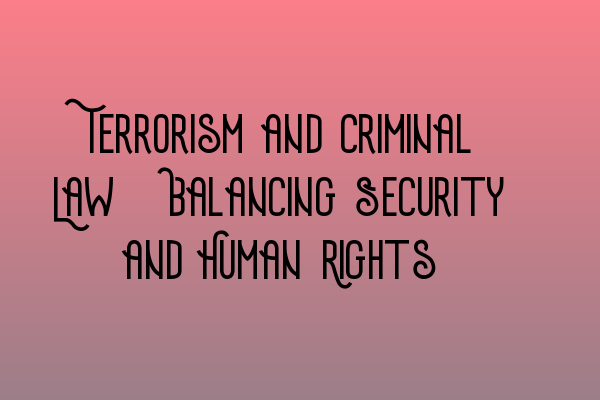Terrorism and Criminal Law: Balancing Security and Human Rights
In recent years, the world has witnessed an alarming rise in terrorist activities, leading to an increased focus on security measures. As a result, nations worldwide have been grappling with the challenge of balancing security concerns with the protection of human rights.
When it comes to combating terrorism, criminal law plays a vital role in ensuring that those responsible for committing terrorist acts are brought to justice. However, it is critical to strike a delicate balance between preserving security and upholding fundamental human rights.
The Impact of Terrorism on Society
Terrorist acts not only cause immediate harm to individuals and communities but also strike fear into the hearts of people, destabilizing societies and disrupting normalcy. Acts of terrorism can result in significant loss of life, destruction of property, and severe psychological trauma.
Given the ongoing threat of terrorism, legislative bodies have enacted robust criminal laws to address these heinous crimes. These laws explicitly define and prohibit terrorist activities, ensuring that those perpetrating such acts face severe consequences.
It is crucial, however, to ensure that in the pursuit of security, the human rights of individuals are not compromised or violated. Upholding human rights is a fundamental principle of a democratic society and must not be sacrificed for the sake of security.
Protecting Human Rights
While addressing the threat of terrorism, it is imperative for governments and legal systems to respect and protect the human rights of all individuals, including both the accused and the potential victims. These rights include the rights to life, freedom from torture, freedom of expression, and a fair trial.
In the United Kingdom, the criminal justice system operates under the principle of “innocent until proven guilty.” This principle ensures that anyone accused of a crime, including terrorism, is given a fair opportunity to defend themselves and present their case before a court of law.
However, striking the right balance between security and human rights is not without its challenges. In the face of terrorist threats, governments often feel compelled to introduce measures that may encroach upon certain civil liberties. This delicate balance requires constant evaluation and refinement to avoid a disproportionate erosion of individual rights.
The Role of Criminal Law
Criminal law serves as a framework within which acts of terrorism are classified and penalized. It enables prosecutors to charge individuals involved in terrorist activities, presenting evidence in a court of law to establish their guilt beyond reasonable doubt.
Prosecutions related to terrorism demand a meticulous approach, considering the complex nature of these cases. The burden of proof rests firmly on the prosecution, requiring them to present compelling evidence that establishes the accused’s involvement in terrorist acts.
With the evolution and diversification of terrorist tactics, criminal law needs to remain adaptive and robust. Legislators must continually assess the effectiveness of existing laws and introduce new measures to combat emerging threats.
Maintaining Public Trust
In the fight against terrorism, it is essential for legal systems to maintain public trust and confidence. This can only be achieved by ensuring that the criminal justice process is transparent, fair, and free from political interference.
By upholding the rule of law and respecting human rights, societies can demonstrate their commitment to justice while effectively addressing the threat of terrorism. This approach not only protects the rights of individuals but also serves as a deterrent to would-be terrorists, safeguarding the security of the nation.
Conclusion
Striking a balance between security and human rights is a continuous challenge faced by governments and legal systems worldwide. Terrorism poses a significant threat to societies, necessitating robust criminal laws to combat these acts.
It is crucial, however, that in the pursuit of security, the preservation of human rights remains paramount. Upholding fundamental principles of justice, fairness, and transparency ensures that both the accused and potential victims are treated with dignity throughout the criminal justice process.
By maintaining this delicate balance between security and human rights, societies can effectively combat terrorism while preserving the values that underpin democratic societies.
Related Articles:
